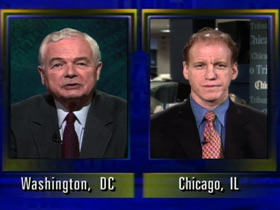Death Penalty Debate
BOB ABERNETHY, anchor: In this country, debate about the death penalty has been revived and sharpened, on all sides, by last weekend’s dramatic actions in Illinois. The outgoing Republican governor, George Ryan, pardoned four death row inmates and commuted the death sentences of all 167 others on death row. Ryan called the capital punishment system “arbitrary and capricious, therefore immoral.”
Steve Mills has been covering the Illinois story for the CHICAGO TRIBUNE. Steve, welcome. What is the reaction this week in Illinois to what Governor Ryan did?
STEVE MILLS (CHICAGO TRIBUNE): Well, it’s been very sharply divided. Prosecutors like Dick Divine in Cook County here say that the governor overstepped his bounds. And families, they just think the governor has betrayed them entirely. Defense lawyers and death row inmates and their families are very heartened by what happened.
ABERNETHY: Some people on death row, I have heard, don’t want to be moved back to the regular prison situation?
MR. MILLS: Well, the common theme on death row is that if you’re there, the media and the courts will give your case a little more consideration than they might give the garden-variety murderer. There are also some issues with creature comforts — that on death row you are left alone, you have better TV — things like that.
ABERNETHY: What have you heard from people in the victims’ families?

MR. MILLS: Well, Sam Evans, whose daughter and grandchildren were murdered in DuPage County, outside of Chicago, felt that he was betrayed by the governor, that the governor had said he wouldn’t take this sort of broad action and did anyway. He was deeply disappointed.
ABERNETHY: Was there any religious reason for what Governor Ryan did?
MR. MILLS: The only allusion that he made, or reference that he made, was that he didn’t want to play God. Otherwise, no.
ABERNETHY: And what about religious leaders? What was their reaction?
MR. MILLS: Surprisingly they have been very quiet. Before he made his decision, we didn’t hear much from them and since then we haven’t heard much either.
ABERNETHY: Steve, has the significance of what Governor Ryan did — or his sincerity — has that been discounted at all because he is the center of a corruption scandal?
MR. MILLS: Well, those who oppose the commutations have always suspected that he was doing this as cover for the corruption scandal and for his possible indictment. His supporters say that he is following his heart and that he looked at the cases and did the right thing.
ABERNETHY: What happens now in Illinois about the death penalty?
MR. MILLS: Well, there are a number of reforms on the table — such things as outlawing the execution of the mentally retarded, limiting the number of factors that make someone eligible for the death penalty. The new governor, Rod Blagojevich, has said he will continue the moratorium, and prosecutors are seeking death sentences against new defendants. So death row will soon fill up again.
ABERNETHY: Illinois is one of 38 states that has the death penalty. What do you hear about what people are saying about what is likely to happen nationally now, as a result of what Illinois did?
MR. MILLS: I think that what might happen is that states that practice the death penalty a lot –states like Texas or Virginia or Florida — will sort of become isolated and the other states on the edges — Connecticut, Nebraska — they may give it up entirely. And even in Illinois, they are talking about that as well.
ABERNETHY: Many thanks to Steve Mills of the CHICAGO TRIBUNE.
MR. MILLS: My pleasure.







